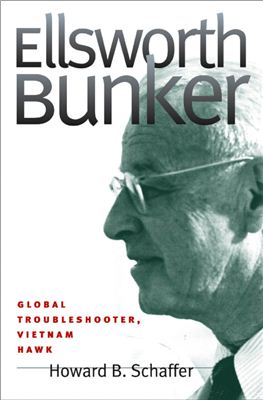The University of North Carolina Press, 2003 - 416 p. ISBN10:
0807828254 ISBN13: 9780807828250 (eng)
In this first biography of Ellsworth Bunker (1894-1984), Howard Schaffer traces the life of one of America's foremost diplomats of the postwar era from his formative years as a successful businessman and lobbyist through a long career in inteational affairs.
Named ambassador to Argentina by Harry Truman in 1951, Bunker went on to serve six more presidents as ambassador to Italy, India, Nepal, and Vietnam and on special negotiating missions. A widely recognized "hawk," Bunker helped shape U.S. policy in Vietnam during his six-year Saigon posting. Using letters Bunker wrote to his wife as well as recently declassified messages he exchanged with Henry Kissinger, Schaffer examines how Bunker promoted the war effort and how he regarded his mission. After leaving Saigon on his seventy-ninth birthday, Bunker became a key figure in the treaty negotiations, spanning three presidencies, that radically changed the operation and defense of the Panama Canal.
Highlighting Bunker's views on the craft of diplomacy, Schaffer paints a complex picture of a man who devoted three decades to inteational affairs and sheds new light on post-World War II American diplomacy.
In this first biography of Ellsworth Bunker (1894-1984), Howard Schaffer traces the life of one of America's foremost diplomats of the postwar era from his formative years as a successful businessman and lobbyist through a long career in inteational affairs.
Named ambassador to Argentina by Harry Truman in 1951, Bunker went on to serve six more presidents as ambassador to Italy, India, Nepal, and Vietnam and on special negotiating missions. A widely recognized "hawk," Bunker helped shape U.S. policy in Vietnam during his six-year Saigon posting. Using letters Bunker wrote to his wife as well as recently declassified messages he exchanged with Henry Kissinger, Schaffer examines how Bunker promoted the war effort and how he regarded his mission. After leaving Saigon on his seventy-ninth birthday, Bunker became a key figure in the treaty negotiations, spanning three presidencies, that radically changed the operation and defense of the Panama Canal.
Highlighting Bunker's views on the craft of diplomacy, Schaffer paints a complex picture of a man who devoted three decades to inteational affairs and sheds new light on post-World War II American diplomacy.

